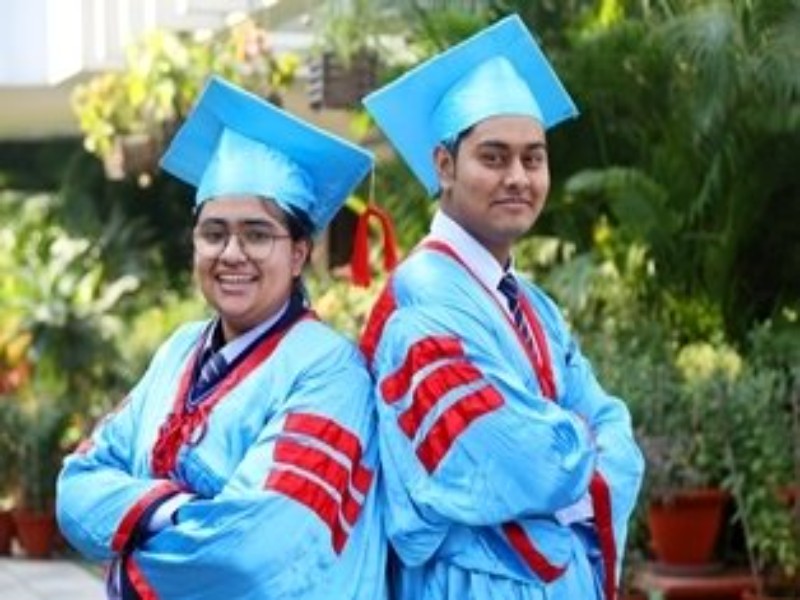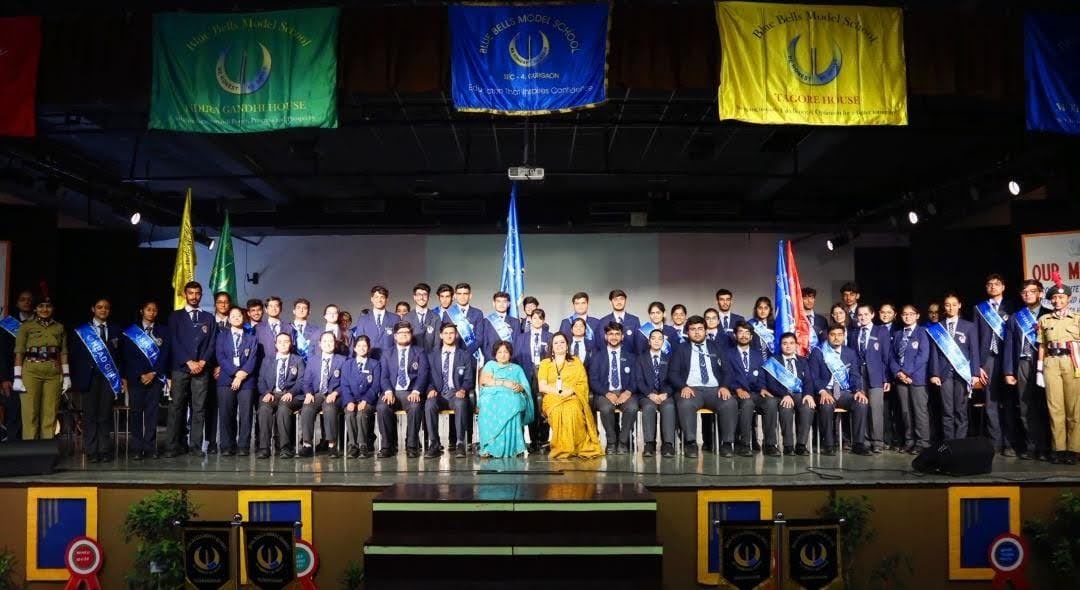Students Corner: Amartya Jha & Manya Srivastava, BBMS Gurgaon
Amartya Jha, the Head Boy of Blue Bells Model School, Sector 4, Gurugram has a passion for Economics and society. He aspires to pursue an honours degree in Economics from a reputed college under Delhi University and continue his postgraduate/doctoral studies in the US or UK. Head Girl Manya Srivastava on the other hand, has a keen interest in Humanities stream and wants to take up a major in Journalism. She aspires to pursue her graduation from one of the ace colleges in Delhi and wants to give back to the society. Her love for public speaking, research, and creative writing fits completely with her role at the school.
EducationWorld talks to Amartya Jha and Manya Srivastava in the next story of the Students’ Corner series which places special emphasis on students and their views.
The Students council representative is a coveted position. How do you carry out your responsibilities and studies together?
One way to balance responsibilities as a student council representative and studies is to prioritise and plan effectively. This may involve creating a schedule or to-do list that allocates specific blocks of time for council duties, studying and other responsibilities. It can also be helpful to set specific goals and deadlines for tasks related to both council duties and academics, and to break larger tasks into smaller, manageable steps. Additionally, effective time management and stress management techniques, such as taking breaks and practicing self-care, can help to reduce feelings of overwhelm and ensure that you are able to focus and be productive. It’s also important to communicate with your teachers, classmates, and council members, to keep them informed of your schedule and responsibilities, and to ask for help or support when needed.
Q- Mention the challenges that come alongside this post.The first challenge is to balance our studies, the co-curricular and the council work which may not sound like a very big deal but is extremely tough. At some point, one of the three would get hampered, and you’ll feel stressed. So, managing your time and being organised is very important. Another challenge that we feel, some of us face is to become very conscious of what we do and say because we are not just students now but also someone that holds a lot of responsibilities. It can be taken positively as well, as it keeps a check on us. Sometimes, the challenges can come from our peers, and they try to negatively influence us. Overcoming all these small hurdles have made us stronger, I believe. It’s given us much more confidence in ourselves and as a team.
Working as the Head Boy/Head Girl has its own pros and cons. Friends have their umpteen demands on you. How do you maintain the same? How do you deal with your friends?
Be a living expression of your values, wear them, speak them, make decisions aligned with them and being the Head of the Student Council is realising your value systems. This takes a lot of effort, but once realised, it becomes your strongest pillar during any type of situation. It is not hard to make decisions once you are crystal clear with what your values are. It takes an extremely strong resolve to stick with what your principles say is right, and not get swayed away. Being the teenagers, it is not uncommon to see our peers’ enjoying things, while we work on our next project or extra assignments. We have our friends’ demanding things from us, asking us to act in a certain way. Sometimes in the beginning, it was a tough task to get over those demands, but once we realised what we stood for, what is right and what is not, and what integrity means in our lives, it became a cakewalk to deal with such umpteen demands. Advancing towards the end of our school life, what we have learnt is that many people will have expectations and unreasonable demands, but you are not responsible for meeting their demands. Although as a leader, we ought to listen to people, but we also need to make sure that we do not allow any and all demands of people to freely march into our lives and influence us, we need to be mentally strong and committed to our values, at all times.

How long do you spend on social media? If yes, how does it help you in life or how does it distract you in life? (Whichever is applicable for you)
“When you give everyone a voice and give people power, the system usually ends up in a really good place,” says Mark Zuckerberg. Unequivocally social media can be a useful tool for staying connected with friends and family, finding and sharing information, professional networking and building relations.
My journey from twitterholic and social media fanatic to social media lackadaisical has been cumbersome where pals thought that I was bragging about my lack of social media activity. There are certainly people who wear quitting social media as a rebellious badge of honour and I proudly admit that I was one of them.
In due course of time, I realized overuse of social media can be distracting and can negatively impact mental health, relationships, and time management. Additionally, it is important to be aware of the potential negative effects of social media and to take steps to mitigate them, such as by limiting exposure to negative content, being mindful of online relationships, and taking breaks from social media.
Q- Have you understood the National Education Policy 2020’s takeaways?
The National Education Policy (NEP) 2020 is expected to have several impacts on students in India. Some of the potential impacts include:
Increased access to education: The NEP aims to increase enrolment and retention in schools and higher education institutions, with a particular focus on disadvantaged and marginalised groups. This could lead to more students, particularly those from low-income or rural backgrounds, having greater access to education.
Improved quality of education: The NEP emphasises the importance of quality education and aims to improve the overall standard of teaching and learning. This could lead to students receiving a more well-rounded and holistic education that is less focused on rote-based learning.
Greater emphasis on skills and vocational education: The NEP places a greater emphasis on vocational and skill-based education, which could lead to more students being prepared for the workforce. This could be particularly beneficial for students who may not wish to pursue higher education.
Increased use of technology in education: The NEP proposes the increased use of technology in education, which could lead to more students having access to digital resources and tools. However, it also depends on the availability of the infrastructure and digital resources in the areas.
NEP aims to ensure equity and inclusion in and through education by addressing all forms of exclusion and marginalisation, disparity, vulnerability and inequality in education access, participation, retention and complete on and in learning outcomes.
Overall, the NEP’s impacts on students will depend on how well it is implemented and the resources available for its execution.
Q- Do you think this post of the Head Boy/Head Girl helps you develop your soft skills and makes you industry-ready? Or is this very much related to school activities only, and the industry is way different? Your views.
Introducing skill-based subjects like Artificial Intelligence, Design Thinking, Data Science and promoting Experiential and Competency-based teaching by the school is a giant leap. The New Education Policy roots for multi-disciplinary institutions where students are groomed to showcase their innovation and creativity. They are trained to have remarkable, meaningful, and productive lives by exposing them to numerous skills and effectively tutoring them to become skilled individuals. Field visit, technology-led innovation, internships, project-based learning, design thinking and entrepreneurial skill training are being made an integral part of the curricula to harness talent and make students industry ready.

Integration of scholastic editions with tertiary education, is imperatively desired as it can be instrumental in fostering growth and boosting the confidence of the 21st century learners. At the school, every endeavour is to provide ample opportunities to students to explore, innovate, apply, and get themselves ready. To remain coordinated with Education 5.0 , the school curriculum is programmed around learning by doing with impetus on ‘Real Life Experiences.’ Research and Project based activities are incorporated in our Science, Mathematics, IT, and AI curriculum along with Design Thinking Approach with STREAM integration, which allows and inspires the students to practise all the elements of design-thinking. School curriculum is mapped with SDG (Sustainable Development Goals) to sensitise and empower our students with knowledge, values, and essential 21st century skills.
Through the prestigious post of Head Boy/Head Girl, the school grilled the soft skills and personal attributes such as teamwork, communication skills, integrity, reliability and self-motivation to make us industry ready. Leadership and learning are indispensable to each other. Our school has invested in nurturing enduring and sustainable skills by organising several events which has subsequently led to a highly synergised talent pool that is skilled and employable.
Our alma mater has nurtured capable and competent leaders who will stand out in the future workplace.
Also Read: Students’ Corner: Kriti Garg, SAI International School

















Add comment